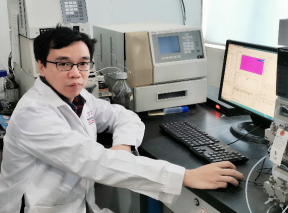
Liang Ouyang

Study on innovative anti-Parkinson disease drug candidates targeting dynamic modification of ULK1 phosphorylation
Liang Ouyang, PhD, State Key Laboratory of Biotherapy and Cancer Center, West China Hospital, and Collaborative Innovation Center of Biotherapy, Sichuan University, Chengdu, China
Parkinson's disease (PD) is a common neurodegenerative disease. With the development of aging population in China, the incidence rate is increasing year by year,which seriously affects the quality of life of the elderly. At present, it is urgent to develop highly effective and low toxic new anti-PD drugs. Based on the structure of the original autophagy target ULK1, BL-918, an agonist with anti PD potential, was designed and synthesized by computer-aided method and chemical space directed synthesis method. BL-918 can specifically activate ULK1 phosphorylation to induce autophagy in vivo and in vitro, and has a good anti-PD effect in animal models. On the basis of previous studies, we plan to optimize targeted small molecules, intervene in the phosphorylation of ULK1, study the structural biology of small molecule-ULK1 complex, and carry out rational drug design and structural optimization of BL-918, and finally obtain 1-2 small molecule anti-PD drugs targeting ULK1 regulation autophagy network with independent intellectual property rights, complete the anti-PD effect study in vivo and illuminate the detailed dynamic modification mechanism. The new structure and mechanism of these compounds are expected to overcome the shortcomings of existing PD clinical drugs, and provide new methods and clues for the research of anti-PD small molecule drugs. Using the optimized compounds to target the phosphorylation modification of ULK1, the treatment and molecular mechanism intervention of PD can be studied, which can be used to study the function of autophagy in neurodegenerative diseases.The study of PD treatment and molecular mechanism intervention by the optimized compounds, targeting phosphorylation modification of ULK1, would pave a way for the functional research of autophagy in neurodegenerative diseases and the further development of anti-PD drugs with new therapeutic strategies.